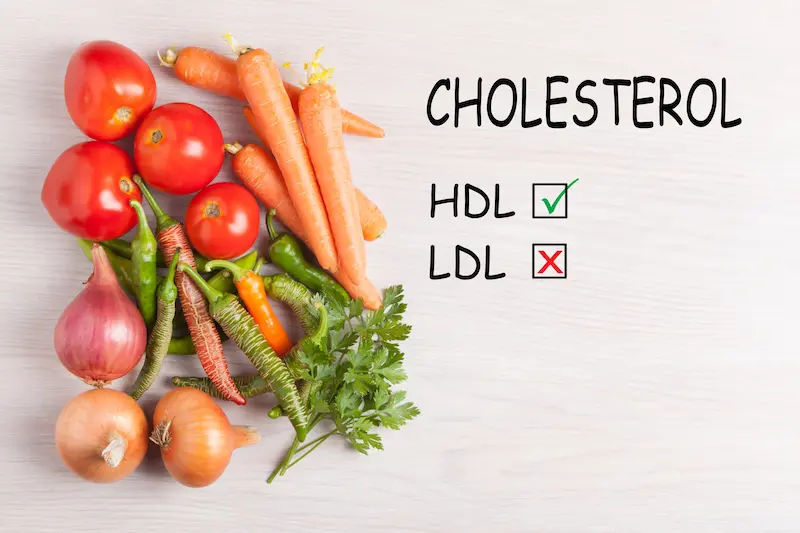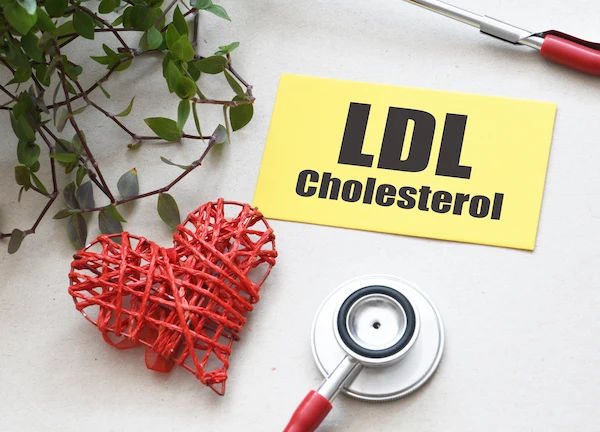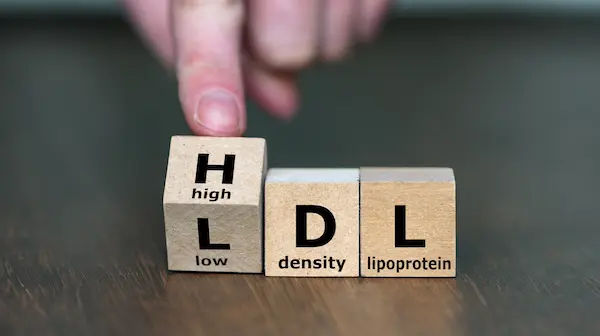Understanding Triglyceride Levels And Treatment Options
Explore the causes, risks, and treatment options for managing triglyceride levels. Learn how high triglycerides impact your health and the steps to take for better heart health.

Written by
Last updated on 13th Jan, 2026
Introduction
Triglycerides are a type of fat (lipid) found in the blood that plays a vital role in the body’s energy storage. Triglycerides play an important role in storing extra calories and giving your body energy between meals. However, when your triglyceride levels get too high, it can lead to serious health problems, especially with your heart and blood vessels, increasing the risk of heart disease, stroke, and other complications. Keeping your triglyceride levels in check is crucial for staying healthy.
This article will explore the importance of triglycerides, how to monitor your triglyceride levels, the potential health risks associated with high triglyceride levels, and various treatment options that can help manage and reduce elevated triglycerides.
What are Triglycerides?
Triglycerides are a type of fat or lipid found in your blood. After eating, the body converts any excess calories not used immediately for energy into triglycerides, which are stored in fat cells. The triglycerides are later released between meals to be used for energy.
The body needs triglycerides for normal bodily functions, as they are an important source of energy. However, an excessive amount of triglycerides in the bloodstream can lead to serious health conditions.
Normal Triglyceride Levels: Understanding the Numbers
Triglyceride levels are measured through a blood test called a lipid panel, which also measures cholesterol levels. The results help healthcare providers assess your risk for cardiovascular diseases. Here’s what the triglyceride numbers mean:
Normal: Less than 150 mg/dL
Borderline High: 150-199 mg/dL
High: 200-499 mg/dL
Very High: 500 mg/dL or higher
The ideal triglyceride level is below 150 mg/dL. When your levels exceed this number, the risk of developing heart disease, stroke, and other health problems goes up. If your triglycerides are higher than 150 mg/dL, it's important to take action to lower them and protect your overall health.
Check Your Triglyceride Levels Checked
Causes of High Triglyceride Levels
High triglyceride levels are influenced by various factors, both genetic and lifestyle-related. Below are the primary causes:
1. Unhealthy Diet
A diet rich in sugary foods, refined carbohydrates (such as white bread and pasta), and unhealthy fats (such as trans fats and saturated fats) can lead to high triglyceride levels. Processed foods, sugary beverages, and excessive alcohol consumption are major contributors to elevated triglycerides.
2. Obesity
Being overweight, especially with abdominal fat, is one of the leading causes of high triglycerides. Fat tissue, particularly visceral fat (fat stored around the organs), promotes the production of triglycerides and lowers the body’s ability to metabolise fat.
3. Physical Inactivity
A sedentary lifestyle, characterised by minimal physical activity, contributes to high triglyceride levels. Regular exercise helps boost HDL cholesterol (the “good” cholesterol), lower LDL cholesterol (the “bad” cholesterol), and reduce triglycerides.
4. Genetics
Some people inherit conditions that result in high triglyceride levels, even if they eat a healthy diet and exercise regularly. Conditions like familial hypertriglyceridemia lead to elevated triglycerides and may require more aggressive treatment.
5. Underlying Medical Conditions
Certain medical conditions can elevate triglycerides, such as:
Diabetes: Poorly controlled diabetes, especially type 2 diabetes, is a significant cause of high triglycerides due to poor fat metabolism.
Hypothyroidism: An underactive thyroid leads to a slower metabolism and can increase triglyceride levels.
Kidney disease: Chronic kidney disease impairs lipid metabolism, leading to elevated triglycerides.
Liver disease: Non-alcoholic fatty liver disease (NAFLD) is linked to high triglyceride levels.
6. Medications
Certain medications can raise triglyceride levels, such as beta-blockers, diuretics, steroids, and some immunosuppressants. If you are taking medications and notice an increase in triglyceride levels, consult with your doctor to explore alternatives.
7. Excessive Alcohol Consumption
Heavy drinking can significantly raise triglyceride levels, as alcohol increases the liver’s production of triglycerides. Reducing or eliminating alcohol intake can help lower triglycerides.
Health Risks Associated with High Triglyceride Levels
High triglycerides, especially when they exceed 200 mg/dL, can increase the risk of several severe health conditions, including:
1. Cardiovascular Disease
One of the most significant risks of high triglycerides is atherosclerosis, the buildup of fatty plaques in the arteries. These plaques narrow the arteries, restricting blood flow, and can lead to heart attacks, strokes, and peripheral artery disease. Elevated triglycerides often occur alongside low HDL cholesterol and high LDL cholesterol, compounding the risk of heart disease.
2. Pancreatitis
Very high triglyceride levels, typically above 500 mg/dL, can lead to pancreatitis, an inflammation of the pancreas. This condition can cause severe abdominal pain, nausea, vomiting, and, in severe cases, can be life-threatening. Pancreatitis caused by high triglycerides often requires urgent medical attention.
3. Metabolic Syndrome
High triglycerides are one of the key components of metabolic syndrome, a cluster of risk factors that includes high blood pressure, high blood sugar, and low HDL cholesterol. Metabolic syndrome significantly increases the risk of heart disease, stroke, and type 2 diabetes.
4. Fatty Liver Disease
Non-alcoholic fatty liver disease (NAFLD) is strongly associated with high triglyceride levels. NAFLD can progress to more serious liver conditions, including cirrhosis or liver failure if left untreated.
How to Lower Triglyceride Levels: Treatment and Lifestyle Changes
Reducing high triglyceride levels is essential for preventing heart disease and other related conditions. Below are the key treatments and lifestyle modifications that can help lower triglycerides:
1. Dietary Changes
Making healthier food choices is one of the most effective ways to lower triglycerides:
Reduce sugar and refined carbs: Cutting back on sugary snacks, sugary drinks, and refined carbohydrates can lower triglycerides significantly. Focus on eating whole grains and complex carbohydrates.
Increase healthy fats: Incorporate foods rich in omega-3 fatty acids, such as fatty fish (salmon, mackerel, sardines), flaxseeds, and walnuts. Omega-3s have been shown to lower triglyceride levels.
Limit alcohol consumption: Alcohol can dramatically raise triglyceride levels, so it is crucial to limit intake or eliminate it entirely.
Avoid trans fats: Eliminate foods with trans fats, such as processed snacks, fried foods, and margarine, from your diet.
2. Regular Physical Activity
Exercise is a powerful tool for improving triglyceride levels. Aim for at least 30 minutes of moderate-intensity exercise (such as brisk walking, cycling, or swimming) most days of the week. Regular exercise helps lower triglycerides by:
Boosting HDL cholesterol (the "good" cholesterol).
Improving fat metabolism.
Helping with weight loss.
3. Weight Loss
If you are overweight or obese, losing even a small percentage of your body weight (5-10%) can have a significant impact on lowering triglyceride levels. A combination of a healthy diet and regular exercise can help achieve and maintain a healthy weight.
4. Medications
If lifestyle changes alone are insufficient to lower triglycerides, your doctor may prescribe medication. Common medications include:
Fibrates (e.g., gemfibrozil or fenofibrate): These drugs lower triglycerides by reducing the liver’s production of triglycerides.
Omega-3 fatty acids: Prescription-strength omega-3 supplements, such as Lovaza or Vascepa, can lower triglycerides.
Statins: Statins are commonly used to lower LDL cholesterol but can also have a modest effect on triglycerides.
Niacin (Vitamin B3): Niacin can help reduce triglyceride levels, though it is less commonly prescribed due to potential side effects.
5. Manage Underlying Conditions
For individuals with high triglycerides caused by conditions like diabetes or hypothyroidism, effective management of these underlying conditions is essential. Controlling blood sugar levels in diabetes and taking thyroid hormone replacements in hypothyroidism can help normalise triglyceride levels.
Conclusion
High triglyceride levels pose a significant health risk, but with appropriate treatment and lifestyle modifications, they can be effectively managed and reduced. Understanding the underlying causes of high triglycerides, regularly monitoring your levels, adopting a balanced diet, increasing physical activity, and addressing any underlying health conditions are essential steps in mitigating the risk of heart disease, stroke, and other related complications.
If you have concerns about your triglyceride levels, it's crucial to consult with your healthcare provider to determine the most suitable course of action. Through regular monitoring and proactive treatment, you can maintain healthy triglyceride levels and enhance your overall health.
Consult Top Cardiologists
Consult Top Cardiologists
Dr. Chandra Kumar Singh
Cardiologist
5 Years • DM CARDIOLOGY
Bhopal
Apollo Sage Hospitals, Bhopal

Dr. Prashant Adeppa
Cardiologist
10 Years • MBBS, MD General Medicine, DM Cardiology (Armed Forces Medical College)
Bengaluru
Apollo Hospitals Bannerghatta Road, Bengaluru

Dr. Dilip Singh Rathore
Cardiothoracic and Vascular Surgeon
15 Years • MBBS, MS, M.Ch(CTVS), Gold Medalist : Minimally Invasive Cardiac Surgeon.
Bhopal
Apollo Sage Hospitals, Bhopal
Dr. Raman Puri
Cardiologist
29 Years • MD, DM
Delhi
Apollo Hospitals Indraprastha, Delhi

Dr. Abhishek Kaushley
Cardiologist
5 Years • MBBS, MD( Medicine), DNB, DM - Cardiology
Bilaspur
Apollo Hospitals Seepat Road, Bilaspur
Check Your Triglyceride Levels Checked
₹369(₹923)60% off





